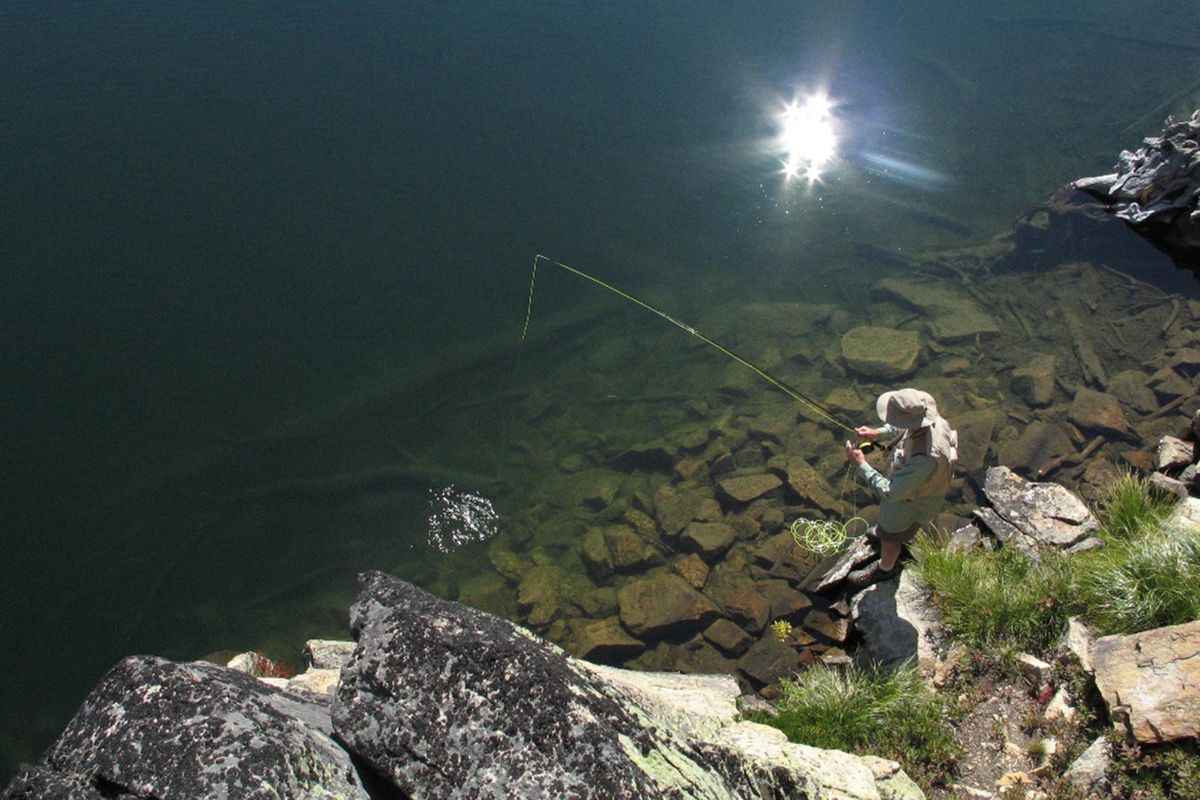High mountain lakes lure summer anglers willing to hit the trail

A mountain lake is worth the hike for an angler seeking a break from searing summer heat.
Heading out with a backpack and a pack rod on a national forest trail can lead to good trout fishing and plenty of elbow room.
In Washington east of the Cascades, nearly 950 lakes lie above 3,500 feet, which qualifies them as high lakes, and some of them hold trout – either naturally reproducing or stocked.
Some of the East Side’s best high lakes fishing for stocked trout is in the Lake Chelan National Recreation area, the Chelan-Sawtooth Wilderness and thereabouts in Chelan and Okanogan counties as well as high lakes in Kittitas County.
Most mountain waters nowadays are stocked by airplanes or helicopters that “bomb” trout fry into high lakes in Washington, Idaho, Oregon and Montana.
Stocking rotations range from annually to every three, four or even 10 years, depending on how much pressure the lake gets. The longer the rotation, the higher the potential for bigger fish in lakes with short growing and fishing seasons.
Many lakes, such as those in the Eagle Cap Wilderness of Oregon, are ice-free only from July through early November.
High lakes trout stocking schedules can be found on state agency websites, but some lakes that have natural reproduction may not be on those lists.
Idaho has a bonanza of more than 3,000 mountain lakes, with roughly 1,300 of them holding fish, says Phil Cooper, Idaho Fish and Game Department educator in Coeur d’Alene.
“In early fish and wildlife management, the importance of maintaining native strains was not widely recognized,” he said. “Although most of the species historically stocked were native to Idaho, they were not always native to the drainage they were stocked in.
“Non-native brook trout were stocked into many lakes in the 1920s to 1950s and they established naturally reproducing populations. Current practices prioritize the use of native strains and species.”
In Oregon, more than 350,000 fingerling trout have been dropped from helicopters into high mountain lakes this year as the seed for good fishing in the upcoming years.
“Trout fishing is still by far our most popular type of fishing in Oregon,” Mike Gauvin, state Fish and Wildlife Department recreational fishing manager, told the Statesman Journal.
Oregon’s fish drop occurs every two years, and it usually takes two years for the small fish to reach the 8-inch size where anglers can keep them.
A helicopter crew can seed as many as 20 lakes with 20,000 trout in a single one-hour flight. In other areas, the agency still must use the old-fashioned way of getting trout to the outback – afoot or on horseback.
A range of fishing methods will take trout at high lakes, although brushy shorelines sometimes limit casting space.
“I have had the best success at mountain lakes when fly fishing,” Cooper said. “Another option is spin fishing using a bobber followed by a fly, a popular choice. … Any small fly pattern that is mostly black with a little red on it seems to work best.”
Mountain lakes trout can be voracious feeders – or not.
On a multiday backpacking trip in the Alpine Lakes Wilderness of Washington a few years ago, I came to a lake just at the right moment in the afternoon to see fish starting to rise to a prolific flight of 3/4-inch-long ants.
My buddy and I quickly rigged our four-piece pack rods as the lake surface began to lather with feeding trout.
I cast a Size 12 Royal Trude and immediately caught a cutthroat. Just about any pattern might have worked. Each of us caught a 10- to 14-inch trout on virtually every cast.
After a 50-minute frenzy of success well worth a 10-mile hike, the lake went glassy smooth again. Ants were still on the water, but the fish apparently were gorged.
I cast 10 times without a fish and realized the game was temporarily over.
My friend and I both sat on a log, by our lonesome selves on a wilderness shoreline, and grinned. Someone who might have showed up at the lake about that time would would have fished his head off for nothing.
Timing can be everything, even in paradise.